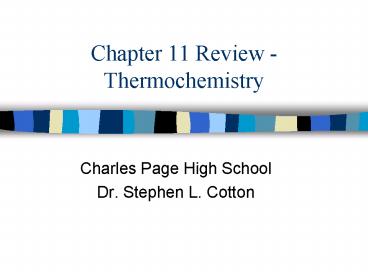Chapter 11 Review Thermochemistry - PowerPoint PPT Presentation
1 / 17
Title:
Chapter 11 Review Thermochemistry
Description:
The quantity of heat that raises the temperature of 1 gram of pure ... Explain why a burn from steam is generally more serious than a burn from very hot water. ... – PowerPoint PPT presentation
Number of Views:126
Avg rating:3.0/5.0
Title: Chapter 11 Review Thermochemistry
1
Chapter 11 Review - Thermochemistry
- Charles Page High School
- Dr. Stephen L. Cotton
2
Chapter 11 Review - definitions
- Thermochemical equation
- joule
- Endothermic process
- Hesss law of heat summation
- Chemical potential energy
3
Chapter 11 Review - definitions
- Heat of combustion
- Calorimetry
- Thermochemistry
- Molar heat of fusion
- Enthalpy
4
Chapter 11 Review
- The quantity of heat that raises the temperature
of 1 gram of pure water by 1 oC is - The amount of heat required to change the
temperature of an object by exactly 1 oC is the
objects
(one calorie)
(heat capacity)
5
Chapter 11 Review
- The number of calories required to raise the
temperature of 55.0 g of water from 25 oC to 45
oC is - If 1 Calorie 4.18 kJ, how many kJ of energy can
be released by a banana containing 150 Cal?
(1.10 x 103 cal.)
(630 kJ)
6
Chapter 11 Review
- What is the specific heat of an 8.0 gram sample
of metal that absorbs 420 J of heat, and changes
from 25 to 50 oC - As perspiration evaporates, your body is cooled.
With respect to your body, this process is said
to be
(2.1 J/g oC)
(exothermic)
7
Chapter 11 Review
- A student mixes two water solutions beginning at
22.0 oC to form a final solution with a mass of
58.0 g at 28.5 oC. What is the heat change, in
kJ? - What is ?H for the following equation I2(s)
62.4 kJ ? I2(g)
(1.58 kJ)
(?H 62.4 kJ)
8
Chapter 11 Review
- Given I2(s) 62.4 kJ ? I2(g), how much heat is
involved in the production of 3.5 mol I2(g)? - Given C3H8(g) 5O2(g) ? 3CO2(g) 4H2O(g)
2220 kJ, how much heat is produced when 80.0 g of
O2 react?
(220 kJ)
(1110 kJ)
9
Chapter 11 Review
- True or False ?Hvap - ?Hcond
- How much heat, in kJ, is released when 108 g of
water at 0 oC freezes to ice at 0 oC if ??Hsolid
for water - 6.01 kJ/mol?
(true)
(36.1 kJ)
10
Chapter 11 Review
- How much heat is released in the condensation of
27.0 g of steam at 100 oC to water at 100 oC , if
?Hcond for water - 40.7 kJ/mol? - If the molar heat of solution of NaOH is - 445.1
kJ/mol, how much heat (in kJ) will be released if
80 g of NaOH are dissolved in water?
(61.0 kJ)
(890.2 kJ)
11
Chapter 11 Review
- Explain why a burn from steam is generally more
serious than a burn from very hot water.
(In vaporizing, steam absorbs the heat required
for vaporization (40.7 kJ/mol). Thus, steam at
100 oC contains more energy than boiling water at
the same temperature.)
12
Chapter 11 Review
- Determine the specific heat of a material if an
18.0 g sample absorbed 75 J as it was heated from
15 oC to 40 oC.
(0.17 J/g oC)
13
Chapter 11 Review
- 27.0 mL of water containing 0.035 mole HCl is
mixed with 28.0 mL of water containing 0.035 mol
NaOH. The initial temperature is 24.0 oC, and
the final temperature is 33.0 oC. How much heat
(in kJ) is released (assume the density of the
solutions is 1.00 g/mL).
(2.11 kJ)
14
Chapter 11 Review
- Given C2H4(g) 3O2(g) ? 2CO2(g) 2H2O(l)
1411 kJ, how much heat is released when 8.00 g of
H2O react?
(118 kJ)
15
Chapter 11 Review
- How many grams of ice at 0 oC can be melted into
water at 0 oC by the addition of 75.0 kJ of heat?
?Hfus for water 6.01 kJ/mol
(225 g)
16
Chapter 11 Review
- What is the enthalpy change, ?H in kJ, for the
following - 2C(s) O2(g) ? 2CO(g)
- when you are given
- C(s) O2(g) ? CO2(g) ?H - 393.5 kJ
- 2CO(g) O2(g) ? 2 CO2(g) ?H - 565.7 kJ
(- 221.3 kJ)
17
Chapter 11 Review
- What is the heat of reaction (?H) for the
combustion of benzene, C6H6(l) to form carbon
dioxide and water? - Standard heats of formation are
- C6H6(l) 48.50 kJ O2(g) 0.0 kJ
- CO2(g) - 393.5 kJ 2H2O(l) - 285.8 kJ
(- 6533.8 kJ)































